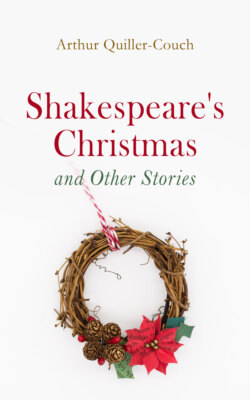Читать книгу Shakespeare's Christmas and Other Stories - Arthur Quiller-Couch - Страница 10
На сайте Литреса книга снята с продажи.
VII
ОглавлениеDawn was breaking down the river; a grey dawn as yet, albeit above the mists rolling low upon the tideway a clear sky promised gold to come—a golden Christmas Day. The mist, however, had a chill which searched the bones. The red-eyed waterman pulled as though his arms were numb. Tom Nashe coughed and huddled his cloak about him, as he turned for a last backward glance on Bankside, where a few lights yet gleamed, and the notes of a belated guitar tinkled on, dulled by the vapours, calling like a thin ghost above the deeper baying of the hounds.
"Take care of thyself, lad," said Shakespeare kindly, stretching out a hand to help his friend draw the cloak closer.
"Behoved me think of that sooner, I doubt," Nashe answered, glancing up with a wry, pathetic smile, yet gratefully. He dropped his eyes to the cloak and quoted—
"Sometime it was of cloth-in-grain, 'Tis now but a sigh-clout, as you may see; It will hold out neither wind nor rain—
and—and—I thank thee, Will——
But I'll take my old cloak about me.
There's salt in the very warp of it, good Yarmouth salt. Will?"
"Ay, lad?"
"Is't true thou'rt become a landowner, down in thy native shire?"
"In a small way, Tom."
"A man of estate? with coat-of-arms and all?"
"Even that too, with your leave."
"I know—I know. Nescio qua natale solum—those others did not understand: but I understood. Yes, and now I understand that fifth act of thine, which puzzled me afore, and yet had not puzzled me; but I fancied—poor fool!—that the feeling was singular in me. 'Twas a vile life, Will." He jerked a thumb back at Bankside.
"Ay, 'tis vile."
"My cough translates it into the past tense; but—then, or now, or hereafter—'tis vile. Count them up, Will—the lads we have drunk with aforetime. There was Greene, now——"
Shakespeare bent his head for tally.
"—I can see his poor corse staring up at the rafters: there on the shoemaker's bed, with a chaplet of laurel askew on the brow. The woman meant it kindly, poor thing!... She forgot to close his eyes, though. With my own fingers I closed 'em, and borrowed two penny pieces of her for weights. 'Twas the first dead flesh I had touched, and I feel it now.... But George Peele was worse, ten times worse. I forget if you saw him?"
Again Shakespeare bent his head.
"And poor Kit? You saw Kit, I know ... with a hole below the eye, they told me, where the knife went through. And that was our Kit, our hope, pride, paragon, our Daphnis. Damnation, and this is art! Didst hear that blotch-faced youngster, that Scotchman, how he prated of it, laying down the law?"
"That Jonson, Tom, is a tall poet, or will be."
"The devil care I! Tall poet or not, he is no Englishman and understands not the race. Art is not for us. We have dreamed dreams, thou and I: and thy dreams are coming to glory. But the last dream of a true Englishman is to own a few good English acres and die respected in a dear, if narrow, round. Dear Will, there is more in this than greed. There is the call of the land, which is home. For me—thou knowest—I had ne'er the gift of saving. My bolt is shot, or almost: two years at farthest must see the end of me. But when thou rememberest, bethink thee that I understood the call. Wilt guess what I am writing, now at the last? A great book—a sound book—and all of the red-herring! Ay, the red-herring, staple of my own Yarmouth. Canst never, as an inland man, rise to the virtues of that fish nor to the merit of my handling. But I have read some pages of it to my neighbours there and I learn from their approving looks that I shall die respected. Yet I, too, forgot and dreamed of art...."
* * * * *
On the Bankside at the foot of Paris Garden Stairs, deserted now of watermen, a youth sat with his teeth chattering.
Above, while he tried to clench his teeth, a window opened stealthily. There was a heavy splash on the tideway, and the window shut to, softly as it had opened. He watched. He was past fear. The body bobbed once to the surface, half a furlong below the spreading, fading circles thrown to the foot of Paris Garden Stairs. It did not rise again. The Bankside knew its business.
A heavy footfall came down the steps to the landing-stage.
"A glorious night!"
The apprentice watched the river.
"A glorious night! A night to remember! Tell me, lad, have I made good my promises, or have I not?"
"They rise thrice before sinking, I have always heard," twittered the lad.
"What the devil art talking of? Here, take my cloak, if thou feelest the chill. The watermen here ply by shifts, and we shall hail a boat anon to take us over. Meanwhile, if thou hast eyes, boy, look on the river—see the masts there, below bridge, the sun touching them!—see the towers yonder, in the gold of it!
London, thou art the flower of cities all!
—Eh, lad?"
The sun's gold, drifted through the fog, touched the side of a small row-boat nearing the farther shore. Behind, and to right and left along Bankside, a few guitars yet tinkled. Across the tide came wafted the voices of London's Christmas bells.
